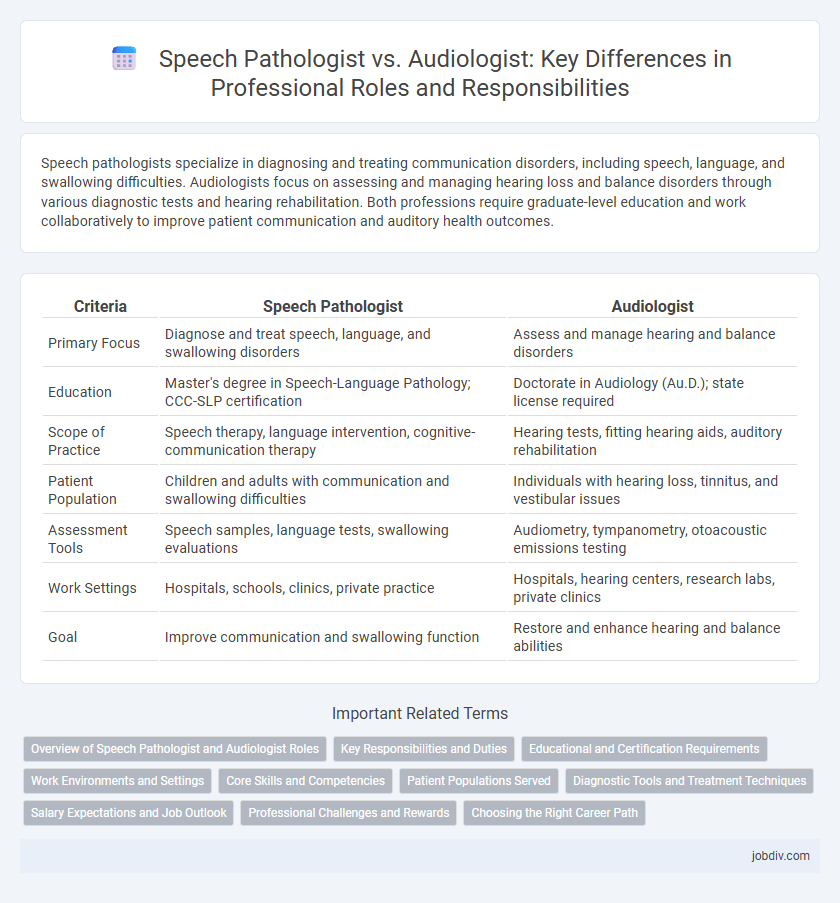Speech pathologists specialize in diagnosing and treating communication disorders, including speech, language, and swallowing difficulties. Audiologists focus on assessing and managing hearing loss and balance disorders through various diagnostic tests and hearing rehabilitation. Both professions require graduate-level education and work collaboratively to improve patient communication and auditory health outcomes.
Table of Comparison
| Criteria | Speech Pathologist | Audiologist |
|---|---|---|
| Primary Focus | Diagnose and treat speech, language, and swallowing disorders | Assess and manage hearing and balance disorders |
| Education | Master's degree in Speech-Language Pathology; CCC-SLP certification | Doctorate in Audiology (Au.D.); state license required |
| Scope of Practice | Speech therapy, language intervention, cognitive-communication therapy | Hearing tests, fitting hearing aids, auditory rehabilitation |
| Patient Population | Children and adults with communication and swallowing difficulties | Individuals with hearing loss, tinnitus, and vestibular issues |
| Assessment Tools | Speech samples, language tests, swallowing evaluations | Audiometry, tympanometry, otoacoustic emissions testing |
| Work Settings | Hospitals, schools, clinics, private practice | Hospitals, hearing centers, research labs, private clinics |
| Goal | Improve communication and swallowing function | Restore and enhance hearing and balance abilities |
Overview of Speech Pathologist and Audiologist Roles
Speech pathologists specialize in diagnosing and treating communication disorders, including speech, language, and swallowing difficulties. Audiologists focus on identifying and managing hearing loss, balance disorders, and related ear problems through hearing tests and rehabilitation. Both professions collaborate to enhance patients' communication abilities and quality of life.
Key Responsibilities and Duties
Speech pathologists specialize in diagnosing and treating speech, language, and swallowing disorders through tailored therapy plans targeting communication improvement. Audiologists focus on identifying, assessing, and managing hearing and balance issues using advanced diagnostic tools and hearing aid fittings. Both professionals collaborate in multidisciplinary teams to enhance patients' communicative abilities and auditory health.
Educational and Certification Requirements
Speech pathologists typically require a master's degree in speech-language pathology and must obtain certification through the American Speech-Language-Hearing Association (ASHA) by completing the Certificate of Clinical Competence (CCC-SLP). Audiologists usually hold a doctoral degree (Au.D.) in audiology and are required to earn licensure and certification, often through ASHA or the American Board of Audiology (ABA). Both professions demand clinical experience hours and passing national examinations to meet state licensure standards.
Work Environments and Settings
Speech pathologists typically work in diverse environments such as hospitals, schools, rehabilitation centers, and private practices, providing therapy for speech, language, and swallowing disorders. Audiologists are often found in audiology clinics, ENT (ear, nose, and throat) offices, hearing aid centers, and research facilities, specializing in diagnosing and treating hearing and balance disorders. Both professions may also operate in community health centers and academic settings, emphasizing collaboration in multidisciplinary teams.
Core Skills and Competencies
Speech pathologists specialize in diagnosing and treating communication disorders, emphasizing skills in speech therapy, language development, and swallowing difficulties. Audiologists possess expertise in hearing assessment, balance disorders, and auditory rehabilitation, utilizing diagnostic tools like audiograms and hearing aids. Both professionals require strong interpersonal communication, critical thinking, and patient-centered care competencies to effectively support diverse client needs.
Patient Populations Served
Speech pathologists primarily serve patients with communication disorders, including speech, language, voice, and swallowing difficulties across all age groups from children to adults. Audiologists specialize in diagnosing and treating hearing and balance disorders, working with patients ranging from newborns to the elderly. Both professionals often collaborate in multidisciplinary settings to address comprehensive communication and auditory health needs.
Diagnostic Tools and Treatment Techniques
Speech pathologists utilize standardized assessments like the Goldman-Fristoe Test of Articulation and language sampling to diagnose speech and language disorders, implementing treatment techniques such as articulation therapy and language intervention strategies. Audiologists employ diagnostic tools including pure-tone audiometry, tympanometry, and otoacoustic emissions testing to evaluate hearing function, applying treatment methods like hearing aid fitting, cochlear implant programming, and auditory rehabilitation. Both professionals use evidence-based approaches tailored to individual patient needs, ensuring precise diagnosis and effective therapy in communication and hearing health.
Salary Expectations and Job Outlook
Speech pathologists earn a median annual salary of approximately $79,000, with growth in demand driven by increasing awareness of communication disorders across all age groups. Audiologists typically have a higher median salary around $85,000, supported by rising prevalence of hearing loss and an aging population requiring specialized care. Job outlook for both fields is positive, with employment projections exceeding 16% growth over the next decade, highlighting strong market demand for expert speech and hearing services.
Professional Challenges and Rewards
Speech pathologists face challenges such as managing diverse communication disorders and navigating complex patient emotional needs, while audiologists encounter difficulties with diagnosing and treating hearing and balance disorders in varied populations. Both professions offer significant rewards through improving patients' quality of life and fostering critical communication skills. The demands require continuous education, empathy, and technical expertise to achieve therapeutic success and patient satisfaction.
Choosing the Right Career Path
Speech pathologists specialize in diagnosing and treating communication disorders, focusing on speech, language, and swallowing difficulties. Audiologists concentrate on hearing and balance issues, conducting hearing tests and fitting hearing aids. Choosing the right career path depends on your interest in either communication disorders or auditory and vestibular health, as well as your preferred work settings and patient populations.
Speech Pathologist vs Audiologist Infographic

 jobdiv.com
jobdiv.com